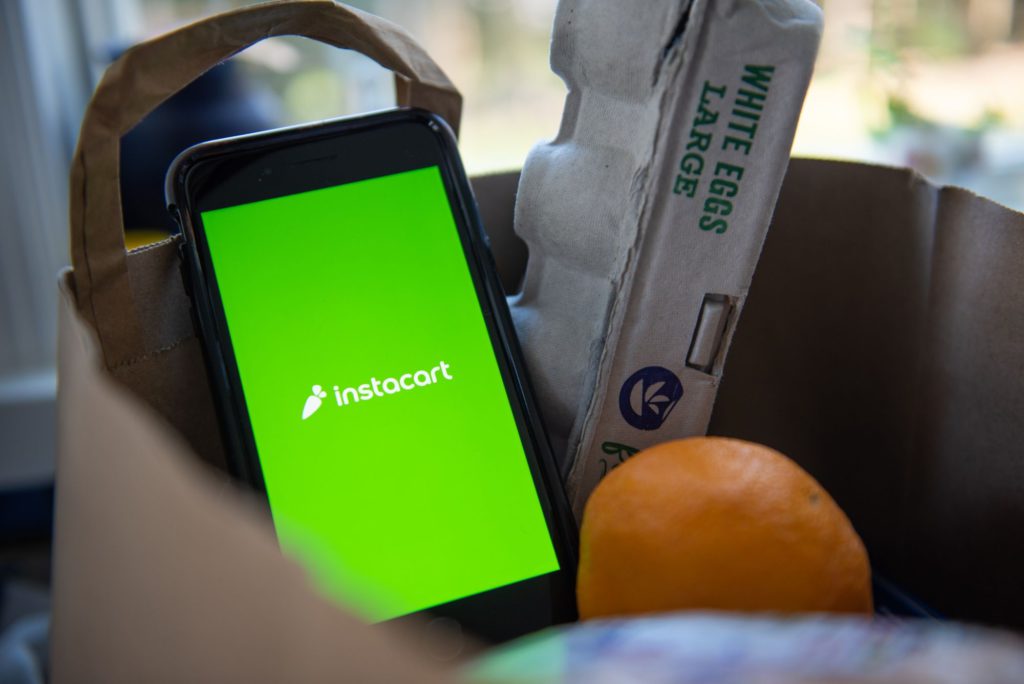(Bloomberg) — Instacart Inc., a pandemic darling that’s now facing decelerating growth, is slashing its valuation by almost 40% to about $24 billion, a move it says will help the company attract talent and adapt to market conditions.
The grocery-delivery startup had been valued at $39 billion in its most recent fundraising round, when it snagged $265 million last year from investors such as Andreessen Horowitz, Sequoia Capital and D1 Capital Partners, as well as Fidelity Management & Research Co. and T. Rowe Price Associates Inc.
Instacart hopes the move will boost recruiting and retention efforts by aligning new equity awards with the updated valuation that could have more potential for gains over the long term if the company regains favor in the markets. Recently, investors have been souring on private and public technology companies.
“Our team built Instacart into the market leader it is today, and we believe investing in them is the right thing to do,” Instacart said in a statement Thursday. “Markets go up and down, but we are focused on Instacart’s long-term opportunity to power the future of grocery with our partners.”
Voluntarily lowering its valuation is an unusual move for a startup and a rare admission that a company got ahead of itself. There have been some instances where companies raised more capital at a lower valuation, known as the dreaded “down round.” Two years ago, Rent the Runway Inc. raised new funding that valued the fashion startup at less than its $1 billion valuation at the time, during the early days of the pandemic.
But in Instacart’s case, the re-valuation was done voluntarily without investors forcing its hand. According to Instacart, the company has more than $1 billion in cash and marketable securities and doesn’t need to raise more capital.
Best known for an app that lets consumers order groceries online from a range of stores, San Francisco-based Instacart became a designated essential service at the height of the Covid-19 lockdowns. But like Uber Technologies Inc. and DoorDash Inc., the company saw its growth stall as the pandemic began to wane.
The prospect of higher interest rates, inflation and a potential recession also has weighed on its valuation. Still, Instacart boosted its revenue by 20% to $1.8 billion in 2021, according to a person familiar with the matter.
Instacart has expanded past grocery delivery since its founding in 2012. Earlier this week, the company launched a platform of services to sell to supermarkets in a bid to bolster its enterprise business. The venture adds another revenue stream in addition to its core marketplace, which commanded 52% of the U.S. grocery delivery market as of December, according to YipitData.
Fidji Simo, a Facebook veteran who oversaw the social media giant’s flagship networking app, took over as Instacart’s chief executive officer in August. She has focused on bolstering the company’s advertising business and sees that higher-margin revenue stream as a “critical part of our future.”
Instacart’s pandemic boom helped turn the grocery startup into one of the most valuable private companies in Silicon Valley. And that has fueled speculation of an initial public offering.
An IPO could still be in the offing, but the timing isn’t clear. Simo declined to provide a timeline on IPO plans in a “Studio 1.0” conversation with Emily Chang earlier this month.
“At some point, of course, but I really want to make sure that the company that we do take public is a company that’s reflective of this new, bolder vision,” she said.
(Updates with financial details in sixth paragraph.)
More stories like this are available on bloomberg.com
©2022 Bloomberg L.P.











